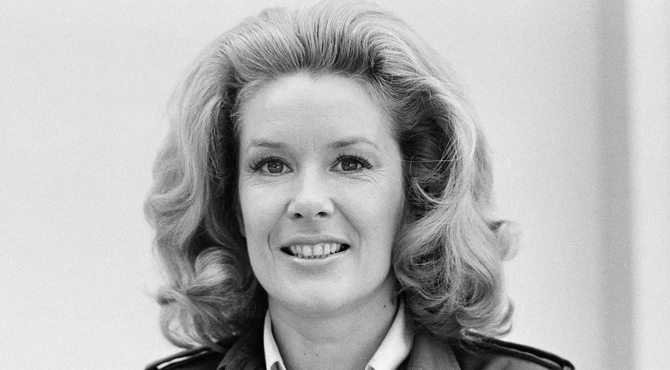Sally Ann Howes, the radiant star of stage and screen who portrayed Truly Scrumptious in Chitty
Chitty Bang Bang and replaced Julie Andrews on Broadway in My Fair Lady, has died. She was 91.
Howes died Sunday in a hospital in Palm Beach Gardens, Florida, The New York Times reported. She was a longtime resident of nearby West Palm Beach.
The Londoner was nominated for a Tony Award in 1963 for her performance as Fiona in a revival of Brigadoon — though the production ran just two weeks — then starred opposite Robert Alda and Steve Lawrence in What Makes Sammy Run? (That one lasted for more than 500 performances in 1964-65).
Earlier, the graceful Howes starred in Lerner and Loewe’s Paint Your Wagon — appearing with her father, popular song-and-dance man Bobby Howes — and in another musical comedy, Summer Song, before earning high marks for a dramatic turn in A Hatful of Rain.
As a youngster, Howes was a contract player at Ealing Studios and the Rank Organisation and appeared opposite Vivien Leigh in Anna Karenina (1948) and with John Mills in The History of Mr. Polly (1949) before toplining a 1950 BBC production of Cinderella.
Howes came to Broadway in February 1958 to portray Eliza Doolittle in the original run of Lerner and Loewe’s My Fair Lady, with her countrywoman Andrews exiting to star in the show’s West End production.
“It was absolutely wonderful when you’re in probably the greatest show that’s ever been written. It’s certainly up among the top 10,” Howes told Playbill in 2007. “I enjoyed it immensely. I loved the American audiences, I loved the show, and I enjoyed being in America. [Broadway] at that time was the capital of musicals.”
In Chitty Chitty Bang Bang (1968), adapted by Roald Dahl from the Ian Fleming 1964 children’s novel, Howes sparkled as Truly, the aristocratic daughter of a confectionery magnate. She got the part without having to audition after Andrews turned down the role, which she felt was too similar to those she had played in The Sound of Music and Mary Poppins.
As the romantic interest of Dick Van Dyke’s inventor Caractacus Potts, Howes performed such wonderful numbers as “Toot Sweets,” “Lovely Lonely Man,” “Hushabye Mountain” and, as a wound-up figurine, “Doll on a Music Box.” (Richard and Robert Sherman were in charge of the music.)
“Music Box” was her favorite, she told Rosie O’Donnell in 1998. “It was the most difficult thing in the whole world. I really was very proud of it. I did it on the set. I was a bit nervous about it, with about 150 extras [looking on]. They put me up on this box and off I went. And I got it in one take!”
Two Barbie dolls based on her Truly Scrumptious were created in conjunction with the movie.
Howes was born in London on July 20, 1930. Her mother was actress-singer Patricia Malone, and her grandfather was Broadway director J.A.E. Malone.
She made her movie debut in the Stewart Granger-starring Thursday’s Child (1943), written and directed by a neighbor, Rodney Ackland, and followed with roles in The Halfway House (1944), Dead of Night (1945), The Life and Adventures of Nicholas Nickleby (1947), Anna Karenina and My Sister and I (1948) before signing a seven-year contract with Rank.
Her first love, however, was the theater. She made her stage debut in Sandy Wilson’s Caprice, then played her real-life dad’s daughter for two years (1953-54) in Paint Your Wagon.
In a 2013 interview with The Palm Beach Post, she said her father tried to upstage her.
“It was the first night, and I stopped the show with ‘What’s Goin’ on Here,’” Howes recalled. “The applause went on and on, and I moved my eyes to stage left and I saw my father coming on several times, a little too soon, intentionally. At one rehearsal, the director told us, ‘Listen, you’ve got to go on as two performers and fight it out.’
“My father taught me everything by example, but he also gave me things to do if anybody played games with me onstage. Come in immediately on someone’s applause, and you will kill it. And if anybody’s getting a laugh, lift a cigarette or pat your hair, use some gesture that will take the eye and ear away from the other performer. It’s like having the atomic bomb.”
Her stage turns in 1956 in Summer Song and in 1957 in A Hatful of Rain established her reputation as a star.
A month after marrying Tony-winning composer-lyricist Richard Adler (The Pajama Game, Damn Yankees), Howes joined My Fair Lady on Broadway. Director Moss Hart “gave me total freedom to create my own Eliza,” she said.
“The best afternoon I ever had was my first matinee,” she recalled. “It was the performance before Julie’s last show, and he wanted me to get [one] under my belt.
“Moss introduced me. He announced that ‘Julie Andrews will not be playing Eliza Doolittle,’ and there was this audible groan. The audience felt cheated, and I immediately felt I had been thrown to the wolves. But by the end of the performance, I had turned them; it was an artist and an audience discovering each other, and it was exhilarating.”
Howes played Eliza for 11 months before Pamela Charles took over for her.
In December 1958, she starred with Gordon MacRae in an NBC musical version of the O. Henry short story The Gift of the Magi, with Adler writing the music for her character. She returned to Broadway in 1961 for the Adler musical Kwamina, but that shuttered after a couple of months.
She re-created her role in Brigadoon in a private White House performance at the invitation of President Kennedy — she also sang for presidents Eisenhower and Johnson — and then returned as Fiona for a 1966 ABC production that co-starred Robert Goulet and Peter Falk.
Howes was back on Broadway in 2000 to play music teacher Aunt Julia for the musical drama James Joyce’s The Dead, for which she earned a Drama Desk nomination.
“I would have liked a film career, but I didn’t pursue it — I just loved connecting with an audience,” she said. “The theater is a drug.”
Howes and Adler divorced in 1966, but she remained close with her adopted sons Christopher, who died in 1984, and Andrew. She married literary agent Douglas Rae in 1972; he died in September.
The Times of London was the first to report her death.










